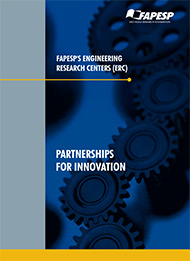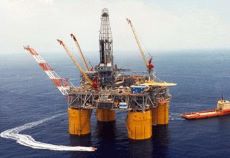FAPESP and Equinor launch petroleum engineering research center

13 de março de 2019
By Elton Alisson | Agência FAPESP – FAPESP and Equinor (formerly Statoil), a Norwegian energy company with Brazilian operations in oil, gas and solar power have launched the Engineering Research Center in Reservoir and Production Management (ERC-RPM) on February 19 at FAPESP’s headquarters in São Paulo.
The mission of the new research center, which is hosted by the University of Campinas (UNICAMP) in São Paulo State, Brazil, is to develop innovative solutions to optimize oil well production efficiency, rehabilitate reservoirs, and improve management of the water extracted as part of the drilling and oil recovery processes.
The center’s creation began in September 2016 when FAPESP and Equinor issued a call for proposals under the foundation’s program of engineering research centers (ERCs). The winning project was submitted by researchers affiliated with UNICAMP’s School of Mechanical Engineering.
“FAPESP’s agreement with Equinor to establish this new research center constitutes one of the goals of the foundation, which is to promote technological entrepreneurship and innovation-related research while facilitating the relationship between business and academia,” said FAPESP President Marco Antonio Zago during the launch event.
The center will pursue three lines of research: production optimization, advanced oil recovery, and water handling. Projects will be conducted by researchers and graduate students enrolled in UNICAMP, in collaboration with colleagues working at Equinor and other universities and research institutions in Brazil and abroad in areas such as mathematics, computer science, mechanical engineering and geology, among others.
“Equinor has a long-term relationship with top-tier universities in Norway and other countries, including Brazil, and we have established partnerships in the past ten years to look for the best solutions to energy and industrial challenges,” said Margareth Øvrum, Equinor’s executive vice president of development and production in Brazil.
“I am confident that these ten years of integrated work in close collaboration with universities will have positive results in terms of new developments and innovative solutions for the oil industry.”
The agreement will last ten years. FAPESP and Equinor will each invest half of the R$25 million in the first five years and the same amount in the next five years. UNICAMP will invest a matching amount in the salaries paid to researchers and support staff and in infrastructure and facilities.
“UNICAMP is committed to promoting research cooperation with the industrial sector in many strategic segments and has created the institutional means to convert the research done at the university into technology and to consolidate innovation. The establishment of this new center is a vitally important step to strengthen the high-level cooperation between the industry and universities in São Paulo State,” said UNICAMP Rector Marcelo Knobel.
The ERC-RPM will operate along similar lines to seven other ERCs in operation that are supported by FAPESP and its partner companies: GlaxoSmithKline, Peugeot-Citroën, Shell, Natura, and the Brazilian Agricultural Research Corporation (EMBRAPA).
The aims of the ERC program, launched by FAPESP in 2014, include fostering and facilitating interactions in research between universities and industrial firms located not only in São Paulo State but also in other regions of Brazil and the world.
“FAPESP’s ERC program has attracted a great deal of interest from companies and universities. It is one of the largest business-academia research collaboration programs in Brazil today,” said FAPESP Scientific Director Carlos Henrique de Brito Cruz.
Equinor has been present in Brazil since 2001, focusing on offshore oil and gas production. One of the goals for the new center is to develop technology for heavy oil production in fields such as Peregrino in Rio de Janeiro State’s Campos Basin, where the company began operating in 2011.
The Peregrino oilfield is Equinor’s largest international operation outside Norway. The challenges of extracting heavy oil here and in similar fields include developing a technique to drill wells so that water, CO2 and other fluids can be injected to maintain a sufficient pressure in the reservoir for the purpose of oil recovery.
Another challenge consists of the development of machinery and pumps in wells and on the seabed to inject fluids that are capable of maintaining the pressure required to transport the extracted oil to the surface.
“Additional energy is needed to pump this heavy oil through valves and pipes up to the surface, where it is separated and treated,” Antonio Carlos Bannwart, a professor at UNICAMP and director of the center, told Agência FAPESP.
Equinor also wants to use the new center to develop technology for subsalt production in the Carcará field, discovered in the Santos Basin in 2012. Equinor acquired a license to develop this play in 2016 and plans to start producing there in 2023-24.
“We are moving into areas in which we do not have much experience. This is one of the reasons for partnering to establish a new center. We need new technologies to solve the technical challenges,” said Ruben Schulkes, Equinor’s research and technology manager in Rio de Janeiro.
In contrast to the heavy oil such as that in the Peregrino field, subsalt oil does not have to be pumped to reach the surface as it is less viscous and already under sufficient pressure, according to Bannwart. The technological challenge in this case is controlling the pressure to recover oil and devising a strategy for the very large amount of gas that comes with it.
“It is necessary to decide how Brazil will use the enormous quantity of gas stored in the subsalt layer, in an amount that is sufficient to supply São Paulo State,” Bannwart said.
The launch ceremony for the new research center was also attended by Eduardo Moacyr Krieger and Fernando Menezes de Almeida – FAPESP’s vice president and administrative director, respectively – and by Patricia Ellen da Silva, who took office as the São Paulo state secretary for economic development in January.
“This project involving the new research center very much represents the new philosophy we want to implement in São Paulo State, which consists of fostering the state’s economic development, productivity and competitiveness by means of investments in science, technology and innovation,” Silva said.



